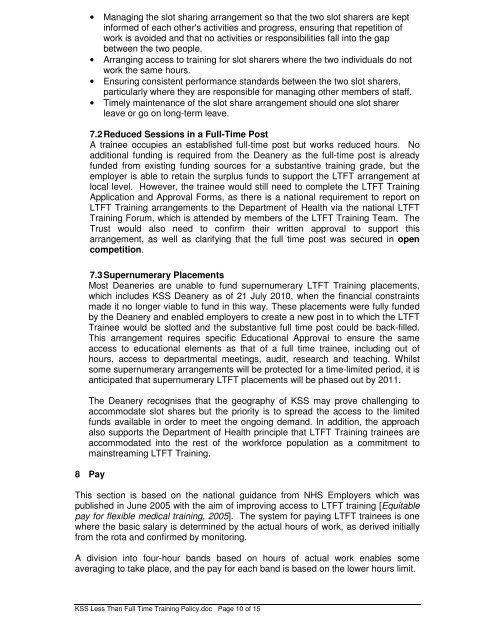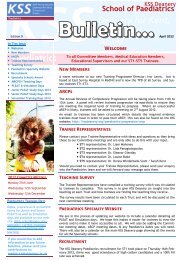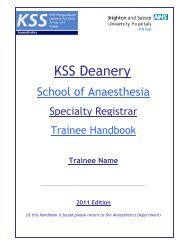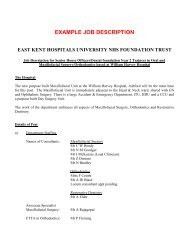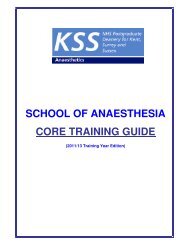Less than Full Time Training Policy - KSS Deanery
Less than Full Time Training Policy - KSS Deanery
Less than Full Time Training Policy - KSS Deanery
Create successful ePaper yourself
Turn your PDF publications into a flip-book with our unique Google optimized e-Paper software.
• Managing the slot sharing arrangement so that the two slot sharers are keptinformed of each other's activities and progress, ensuring that repetition ofwork is avoided and that no activities or responsibilities fall into the gapbetween the two people.• Arranging access to training for slot sharers where the two individuals do notwork the same hours.• Ensuring consistent performance standards between the two slot sharers,particularly where they are responsible for managing other members of staff.• <strong>Time</strong>ly maintenance of the slot share arrangement should one slot sharerleave or go on long-term leave.7.2 Reduced Sessions in a <strong>Full</strong>-<strong>Time</strong> PostA trainee occupies an established full-time post but works reduced hours. Noadditional funding is required from the <strong>Deanery</strong> as the full-time post is alreadyfunded from existing funding sources for a substantive training grade, but theemployer is able to retain the surplus funds to support the LTFT arrangement atlocal level. However, the trainee would still need to complete the LTFT <strong>Training</strong>Application and Approval Forms, as there is a national requirement to report onLTFT <strong>Training</strong> arrangements to the Department of Health via the national LTFT<strong>Training</strong> Forum, which is attended by members of the LTFT <strong>Training</strong> Team. TheTrust would also need to confirm their written approval to support thisarrangement, as well as clarifying that the full time post was secured in opencompetition.7.3 Supernumerary PlacementsMost Deaneries are unable to fund supernumerary LTFT <strong>Training</strong> placements,which includes <strong>KSS</strong> <strong>Deanery</strong> as of 21 July 2010, when the financial constraintsmade it no longer viable to fund in this way. These placements were fully fundedby the <strong>Deanery</strong> and enabled employers to create a new post in to which the LTFTTrainee would be slotted and the substantive full time post could be back-filled.This arrangement requires specific Educational Approval to ensure the sameaccess to educational elements as that of a full time trainee, including out ofhours, access to departmental meetings, audit, research and teaching. Whilstsome supernumerary arrangements will be protected for a time-limited period, it isanticipated that supernumerary LTFT placements will be phased out by 2011.The <strong>Deanery</strong> recognises that the geography of <strong>KSS</strong> may prove challenging toaccommodate slot shares but the priority is to spread the access to the limitedfunds available in order to meet the ongoing demand. In addition, the approachalso supports the Department of Health principle that LTFT <strong>Training</strong> trainees areaccommodated into the rest of the workforce population as a commitment tomainstreaming LTFT <strong>Training</strong>.8 PayThis section is based on the national guidance from NHS Employers which waspublished in June 2005 with the aim of improving access to LTFT training [Equitablepay for flexible medical training, 2005]. The system for paying LTFT trainees is onewhere the basic salary is determined by the actual hours of work, as derived initiallyfrom the rota and confirmed by monitoring.A division into four-hour bands based on hours of actual work enables someaveraging to take place, and the pay for each band is based on the lower hours limit.<strong>KSS</strong> <strong>Less</strong> Than <strong>Full</strong> <strong>Time</strong> <strong>Training</strong> <strong>Policy</strong>.doc Page 10 of 15


